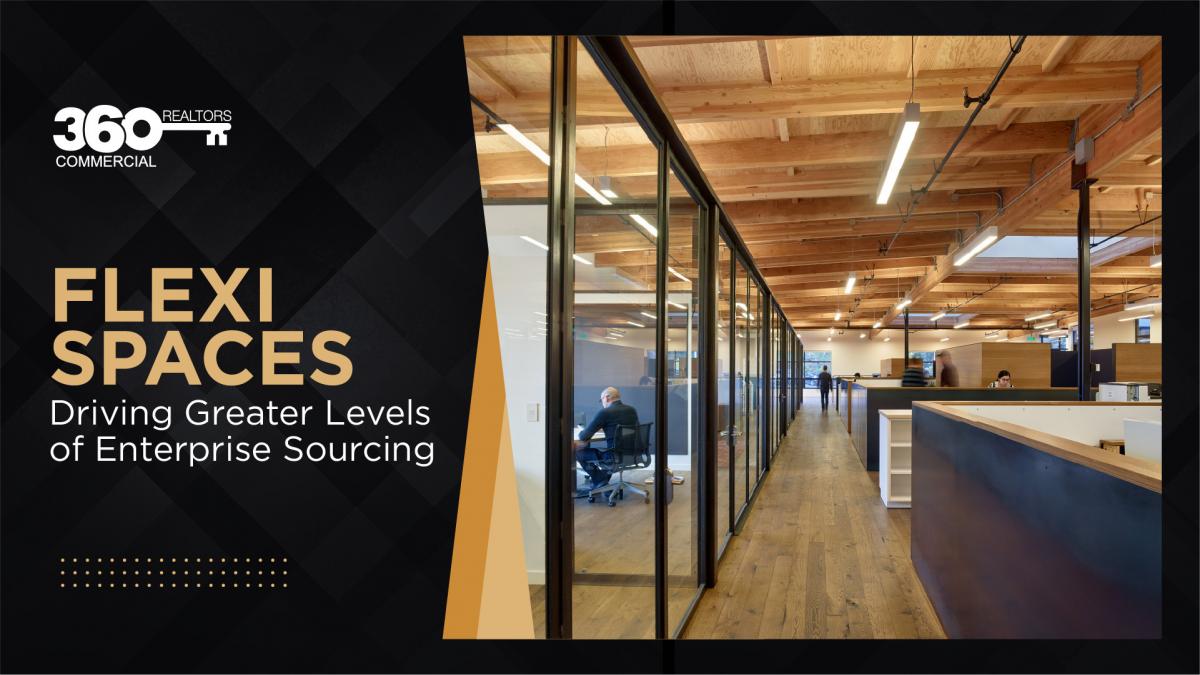Flexibility key to profitability:
Flexible workspace has to lead to a large-scale upswing in enterprise outsourcing in all the capacities, be it the outsourcing of real estate to an operator, now this operator can be the owner of the asset or a third-party flexible workspace operator. Many SMEs and start-ups are considering flexible workspace, as their core space with stable headcount projections, and some of the bigger corporate and IT/ITES companies have made some of their portfolios flexible. The rising variation in products provided by flexible workspace operators has allowed enterprises to actively managing their office space commitments.
The traditional route of delivering office space is hampered by lead times in signing a lease, lengthy procurement processes for build-outs, and the need for capital which could be better used elsewhere. Working with a flexible workspace operator can enable enterprises to manage their portfolio on an on-demand basis, easing friction.
Flexi Space NCR Snapshot:
In the first quarter of 2020, Flexi workspace operators accounted for almost 20 % of the gross take-up in Delhi-NCR. In the Q2 of 2020 due to the lockdown, the demand in the overall office market has remained muted but in the long term, the fundamentals remain strong and demand is likely to be driven by IT-BPM consulting occupiers.
Key drivers for Outsourcing to Flexible Workspace:
Dynamic headcount management: Flexible workspace can allow for agility to grow or contract even when a company has dynamic headcount changes.
Financial ease: Flexible workspace can reduce capital expenditure and provide operational expense certainty.
Operational efficiency: Outsourcing the workspace operations to a third party supplier can deliver better administrative efficiencies.
Ease in business transformations: Flexible workspaces make great sense when an organization is paving its path into new territories or going for any integration and acquisitions can also be driving force behind using outsourced workspaces.
How brokers can leverage this segment: The commercial market changed the office leasing concept in the last few years. The new concept such as Coworking or Managed Office Space constituted 1%-3% in the commercial real estate inventory and the growth is expected to be double in the coming future. The impact of COVID-19 has brought in new trends such as the integration of home as a place of work and the growing importance of the digital experience has also emerged. All these factors have made the flexible office segment, an important sub-sector of commercial realty and all the progressive brokers are adapting to the new reality and models in which asset owners can deliver flexible workspace and the impact they have on valuation, together with the view on fragmentation and community in a post-COVID-19 world.
How operators can leverage this segment: Managed Office Space – A concept in which all the nitty-gritty of office spaces is managed by the 3rd party or outsourced management. This concept is paving the way in India in which everything is taken care of, from sourcing the right property for its client, design, fit-out, negotiation with landlords, and formulating the cost involved, are managed by the 3rd party. The outsourced party would liable to provide build -to-suite space (design, fit-out space such as furniture, Fittings, IT and Telecom, etc) to match the client's vision.
Managed space is a grey area that bridges the gap between a lease and traditional flexible workspace, arguably allowing the occupier to have the best of both worlds.
Benefits for the Organizations: The shifting or opening new branches at any location is a hassle task for any organization. The managed office space will leverage organizations to focus on business rather than to secondary issues.
Hassle-Free Operation – With readily available facilities provide an edge to any organization's focus entirely on operations. The CAPEX charge is also comparatively lesser.
Customized Space – According to the client's budget, the fit-outs and design enable businesses to operate in fully branded office space.
Lease Flexibility – The lease space can be negotiated as per the client requirement such as preferred location, building, fitting brands, expert advice, entry & exit formalities, etc.
Less Handover Time – Easily handover and can move in within 30-40 days.
Benefits of using managed office space:
- If your business happens to be dynamic, then managed office space will be ideal for you. Managed office spaces render freedom to entrepreneurs to move about the business just the way they like. This kind of space is ideal for businesses that are likely to expand or reduce over a short span of time.
- When you have opted for a managed workspace, you get the freedom to focus on your business more than the office.
- In managed office spaces, you pay just one fixed amount every month for all services include. You don’t have to worry about separate utility bills and housekeeping.
- The size of your office in a shared office space changes according to the business. Scalability as an option is what you would not get in a traditional office environment.
Scaling Demand in Tier-1 cities: Tier-1 cities have witnessed the demand for managed office space in last year's. With the burgeoning industrialization, warehousing demand post-COVID-19 will help to proliferate the market in tier-2 & tier-3 cities.
The emergence of Reverse Office Model: The onslaught of COVID 19 crisis has forced the companies to relook at the cost of their office space or move to a cheaper office, aiding companies in this some of the co-working operators are stepping in and offering the companies a way out of their lock-in periods with builders by taking up the vacated space. The co-working operator, through a fresh lease with the developer, is giving partial exit to the original tenant and leasing the remaining space to other clients.
Some of the managed office space providers are coming up with innovative models for keeping the juggernaut rolling. One such provider is Skootr that has come up with the below-mentioned ways to support the tenants in these difficult times. According to Skootr, enterprises save anywhere between 20% to 50% of maintenance and administration costs based on surrendered area, optimized rentals while enjoying the flexibility to scale up and take smaller portions of real estate within the same vicinity as and when required.
Reverse with Anchor: Enterprises can maximize their returns on the existing lease by surrendering their entire portfolio to the managed office space provider and signing a new lease which gives them the freedom and flexibility to twist their conventional lease and shift to a managed office lease.
Consolidation: This is a solution for large enterprises looking to consolidate offices spread across geography to accommodate the manpower at one place and save on the operational costs incurred with multiple locations.
Reverse & Relocate: Enterprises looking at reducing their rental payments considerably by shifting their office to a nearby location with lesser rentals.
Risk-mitigation SOPs and recommendations for manage space operators:
Sanitization: Regular cleaning of high-risk common areas like meeting areas, doorknobs, elevator switches, kitchen areas, hot-desks and etc.
Screening: Regular temperature checks for operational, members, and guests prior to entrance.
Protection: Provisioning of surgical masks to operational teams. Introduction of mandatory wearing of masks by members and guests. For air-conditioning/ventilation, the guidelines of CPWD shall be followed
Protocol: Entrance to have mandatory hand hygiene (sanitizer dispenser) and thermal screening provisions. Installation of the Aarogya Setu App by employees.
Shifts: Staggering of office hours, lunch hours/coffee breaks to be done, as far as feasible.
Seating arrangements to be made in such a way that adequate social distancing is maintained.
Future Prospects: In a post-pandemic world, it will be critical for flexible workspace operators to cultivate community by promoting wellness programs and thoughtful learning opportunities, and to foster a collaborative environment that encourages connection. In the Post COVID scenario, occupiers will look out for operators that can deliver holistic offerings and manage their employees in a safe environment, and this will be a driver for greater levels of enterprise outsourcing.






